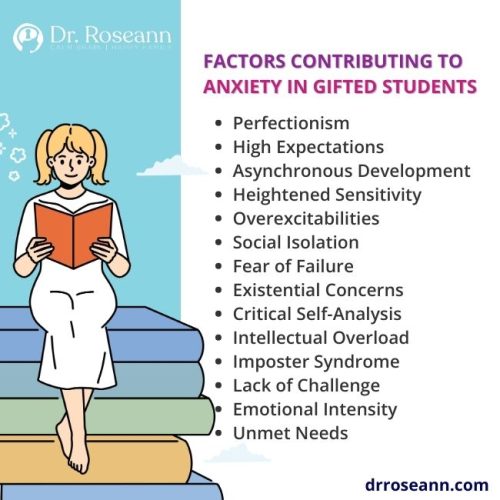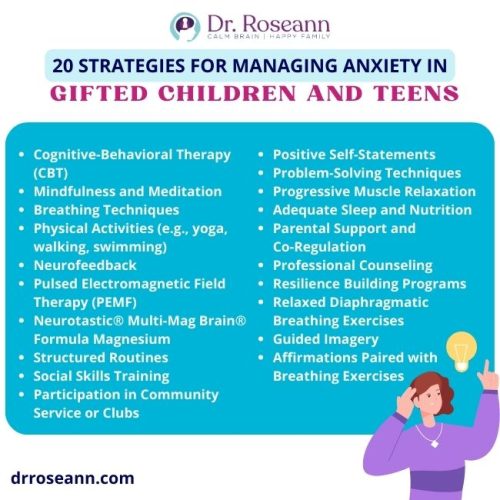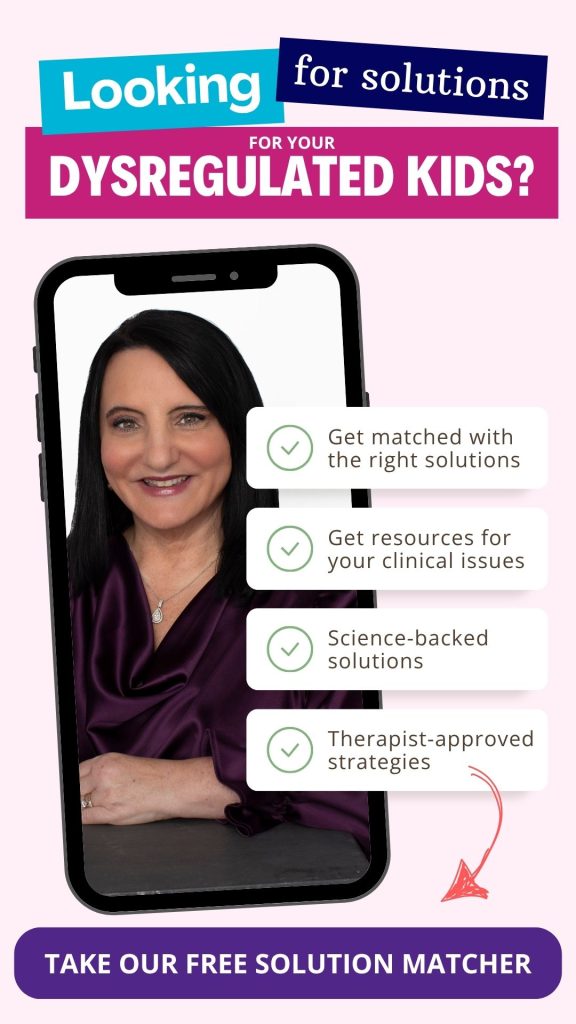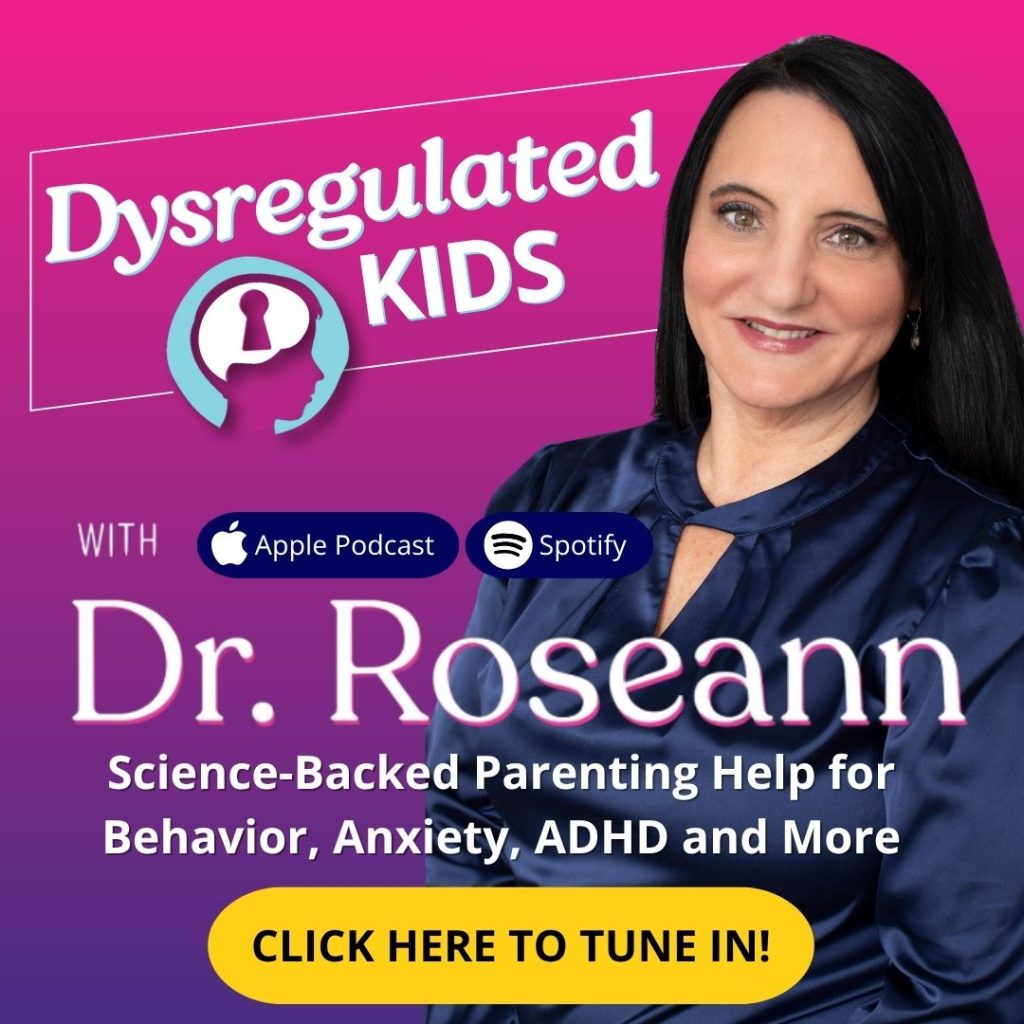Estimated reading time: 7 minutes
I work with so many parents who are raising kids who are incredibly bright—but also extremely anxious. These are the children who constantly worry about climate change, or melt down over a crooked line in their drawing. Their brains are always on and their nervous systems are stuck in high alert.
If your child is constantly anxious, perfectionistic, or overwhelmed—you’re not imagining it, and you’re certainly not alone.
In this blog, I’m going to walk you through what gifted anxiety really looks like, why it happens, and most importantly—what you can do to help your child thrive.
What Is Gifted Anxiety?
Gifted anxiety refers to the emotional distress that often accompanies advanced cognitive abilities in children. These kids think deeply and feel even more deeply. Their brains work quickly—but their emotional regulation doesn’t always keep up.
This mismatch—known as asynchronous development—makes them more prone to anxiety.
What Are the Signs of Gifted Anxiety?
Gifted kids may not always show anxiety in ways adults expect. Instead, you might see refusal, over-preparation, meltdowns, or even withdrawal.
Common signs include:
- Perfectionism – Avoiding tasks for fear they won’t be done “perfectly”
- Overthinking – Constantly being stuck in analysis mode
- Sensory sensitivities – Easily getting uncomfortable to noise, light, or textures
- Social maladaption – Struggling to make or keep friends (Papandreou et al., 2023)
- Sleep issues – Difficulty falling or staying asleep
| Sign | Description | Example Scenario |
|---|---|---|
| Perfectionism | Setting high standards and fear of mistakes | Avoiding a school project because it might not be perfect |
| Heightened Sensitivity | Overreaction to sensory input or criticism | Meltdown due to loud noises in the cafeteria |
| Overthinking | Excessive analysis leading to inaction | Unable to decide on an extracurricular activity |
| Asynchronous Development | Mismatch between cognitive and emotional skills | Advanced in math but struggles with social interactions |
| Social Isolation | Difficulty forming friendships | Prefers to play alone rather than join group activities |
| Somatic Complaints | Physical symptoms with no medical cause | Frequent headaches before school presentations |
| Sleep Disturbances | Trouble falling or staying asleep | Waking up frequently due to worry about school |
| Performance Anxiety | Fear of not meeting expectations | Avoids sports because of fear of losing |
| Existential Anxiety | Worry about life’s big questions | Distress over global issues like climate change |
| Self-Criticism | Harsh self-judgment | Constantly redoing homework to get it just right |
| Excessive Worry | Persistent worry about everyday and future events | Constantly asking parents about their safety |
| Avoidance Behaviors | Avoiding anxiety-inducing situations | Refuses to attend social gatherings or participate in class |
Real-life example:
I remember working with Jennifer, a mom of a brilliant 9-year-old named Mason. MAson would tear up his drawings if one line was off and sob at night about school projects, even when he was doing great. Once we dug deeper, it became clear that Mason’s fear of not meeting his own high standards were fueling his gifted anxiety.
Why Do Gifted Kids Experience So Much Anxiety?
Gifted children process the world more intensely:
- They’re deeply self-aware and sensitive to criticism
- They worry about existential issues at a young age
- They often feel misunderstood or socially out of step
Combine that with high expectations from themselves or others, and it’s no wonder anxiety levels soar in gifted kids (Duplenne et al., 2024).
Research shows that children with high IQs report significantly higher rates of anxiety and mood disorders (Karpinski et al., 2018).
What Makes Gifted Anxiety Different from General Anxiety?
While all anxiety stems from a dysregulated nervous system, gifted anxiety is uniquely shaped by a child’s intense intellect, imagination, and emotional sensitivity.
Key differences:
- Gifted kids are more likely to internalize and mask symptoms
- Their fears may be existential, not just social or academic
- They often ruminate and catastrophize more deeply
Gifted kids can tell you how black holes work—but can’t tell you why they’re sobbing in their room. That’s what asynchronous development looks like.

What Contributes to Anxiety in Gifted Children?
Gifted anxiety isn’t caused by one thing—it’s a layered experience driven by how their brains and bodies interact with the world.
Here’s what we often see:
- Psychological and physiological overexcitabilities – Gifted kids often have heightened sensory processing. I’ve had kids describe school like a “volume dial stuck on high.” Bright lights, loud noises, and even certain smells can feel overwhelming.
- Perfectionism and high expectations – Many gifted children set impossibly high standards. They’d rather not try than fail. And when they don’t meet their own expectations? The shame and anxiety can spiral fast.
- Deep rumination and hyper-awareness – Gifted kids often replay events, overthink conversations, and obsess over big ideas (like death or climate change) far earlier than most peers.
- Social disconnect or isolation – They may feel different from peers, leading to loneliness, or they avoid situations where they might be judged or not excel.
One study found that around 20% of individuals with high intelligence report anxiety disorders—often at greater intensity than the general population (Karpinski et al., 2018).
These traits aren’t deficits—but without support, they can make life more overwhelming for a gifted child.
How Can I Help My Gifted Child Manage Anxiety?
Anxiety in gifted kids is manageable—but only when we support both their cognitive and emotional needs.
Strategies to Try:
- Cognitive-behavioral therapy (CBT) – Especially effective when tailored to gifted learners
- Mindfulness and breathwork – Help them slow down racing thoughts
- Co-regulation – Stay calm during their big feelings to help their brain settle
- Reframing mistakes – Teach them failure is part of learning
💡 Want more tools to help your child regulate their emotions? Download our free Self-Regulation Toolkit designed for overwhelmed parents.
What Tools Help Calm the Nervous System in Gifted Kids?
To address anxiety at its root, we must help the brain calm down.
Brain Tools That I Use:
- Neurofeedback – Teaches the brain to regulate itself without medication
- PEMF (Pulsed Electromagnetic Field Therapy) – Naturally calms the nervous system.
- Magnesium L-Threonate – Supports emotional regulation
These tools can create lasting brain changes—especially when used alongside therapy.

How Do I Support My Gifted Child at Home and in School?
Gifted kids thrive when both parents and educators understand their emotional needs—not just their intellect.
At Home:
- Normalize anxiety conversations
- Build predictable routines
- Model healthy stress management
At School:
- Ask for school-based mental health support (e.g., CBT groups, counseling)
- Encourage participation in clubs where they can meet like-minded peers
- Request gifted-informed interventions that include emotional development
How We Helped Mason and Jennifer
Jennifer and I worked closely over several months to give Mason the tools he needed to manage his emotions. We started with calming his nervous system—using neurofeedback and magnesium—and layered in some gentle CBT strategies that helped Max reframe his inner critic.
We also coached Jennifer on co-regulation, so Max didn’t feel alone in his big emotions. And you know what happened? He began to take risks again. He raised his hand in class. He submitted his artwork. And most importantly, he started to believe that being gifted didn’t mean he had to be perfect.
Mason is now thriving, exploring robotics and creative writing—and smiling a whole lot more. That’s the power of calming the brain first and meeting kids where they are.
What Happens If Gifted Anxiety Goes Untreated?
When we don’t address gifted anxiety, it doesn’t just go away—it grows roots. Over time, it can chip away at a child’s confidence, joy, and ability to thrive
Possible consequences:
- School refusal or underachievement
- Depression or panic disorder
- Substance use to cope with stress
That’s why we step in early. Gifted kids may look fine on the outside, but inside, their brains are working overtime. When we help calm the nervous system, we make space for their full potential to shine.
You Can Help Your Gifted Child Thrive
Gifted children feel deeply, think intensely, and need support that honors both. Anxiety is not a failure of parenting—it’s often a sign of a nervous system stuck in overdrive.
Calm the brain first. Teach coping skills. Create environments where your gifted child feels seen, understood, and safe to be imperfect.
✨ It’s not bad parenting—it’s a dysregulated brain. And it’s gonna be OK
FAQs
What age does gifted anxiety usually show up?
Anxiety can appear as early as preschool in gifted children—especially those with high sensitivity. Signs may include sleep issues, tantrums, or refusal to go to school.
Is my child gifted or just anxious?
They could be both. Giftedness and anxiety often go hand-in-hand, especially if your child is highly verbal but easily overwhelmed. A QEEG brain map can help identify patterns of dysregulation.
Does gifted anxiety go away on its own?
Not usually. Without support, anxiety often becomes worse over time. The good news is: with the right tools, your child can learn to manage it effectively.
Can therapy help even if my child is very logical?
Yes! In fact, CBT and brain-based therapies like neurofeedback are especially effective because they speak to the analytical side of gifted kids.
Should I tell my child they are gifted?
Yes—but frame it as a whole-person strength that includes emotional needs, not just academics. Help them understand that feeling deeply is part of who they are.
Citations:
Duplenne, L., Bourdin, B., Fernandez, D., and Biondelle, G. (2024). Anxiety and depression in gifted individuals: a systematic and meta-analytic review. Gifted Child Quarterly 68(1). https://doi.org/0.1177/00169862231208922.
Karpinski, R. I., Kolb, A. M., Tetreault, N. A., & Borowski, T. B. (2018). High intelligence: A risk factor for psychological and physiological overexcitabilities. Intelligence, 66, 8–23. https://doi.org/10.1016/j.intell.2017.09.001.
Papandreou, A., Athinaiou, E., and Mavrogalou, A. (2023). Conforming and condescending attitude of gifted children in response to their social anxiety and asynchronous cognitive and emotional development. Biomed J Sci & Tech Res 50(2). Retrieved from https://biomedres.us/pdfs/BJSTR.MS.ID.007934.pdf
Dr. Roseann is a mental health expert in Anxiety who frequently is in the media:
- What If It’s Not Depression With Dr. Stein Anxiety, OCD and Trichotillomania
- Barriers to Bridges Breaking the Cycle of Anxiety and Harnessing the Healing Power of Meditation
- CBS2 New York Experts Offer Tips on How to Help Children Deal With Anxiety
Always remember… “Calm Brain, Happy Family™”
Disclaimer: This article is not intended to give health advice and it is recommended to consult with a physician before beginning any new wellness regime. *The effectiveness of diagnosis and treatment vary by patient and condition. Dr. Roseann Capanna-Hodge, LLC does not guarantee certain results.
Are you looking for SOLUTIONS for your struggling child or teen?
Dr. Roseann and her team are all about science-backed solutions, so you are in the right place!










